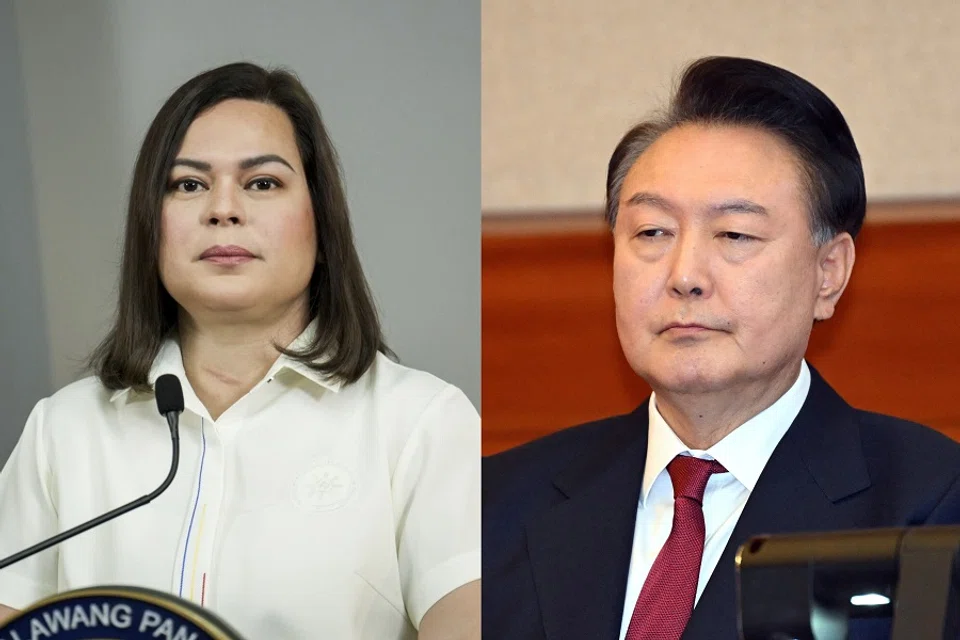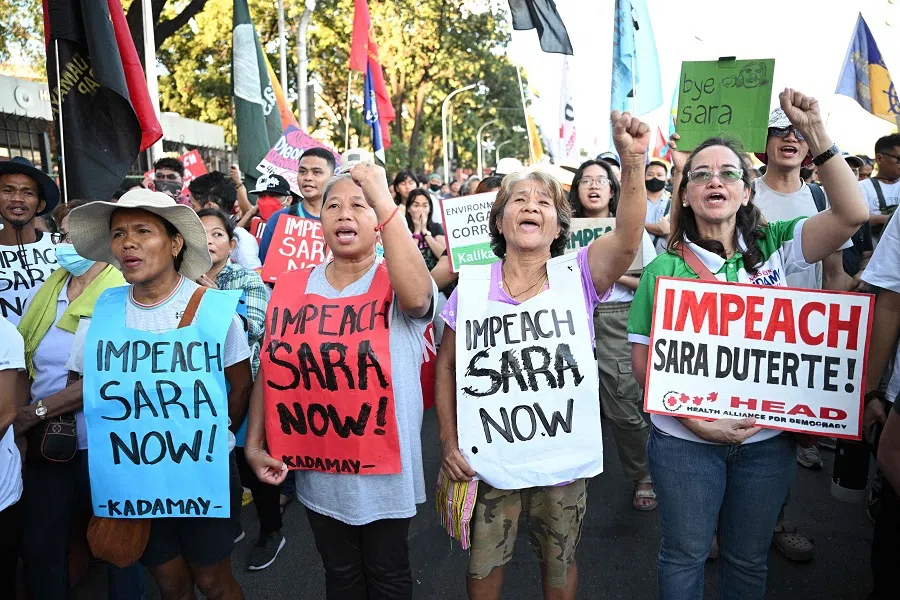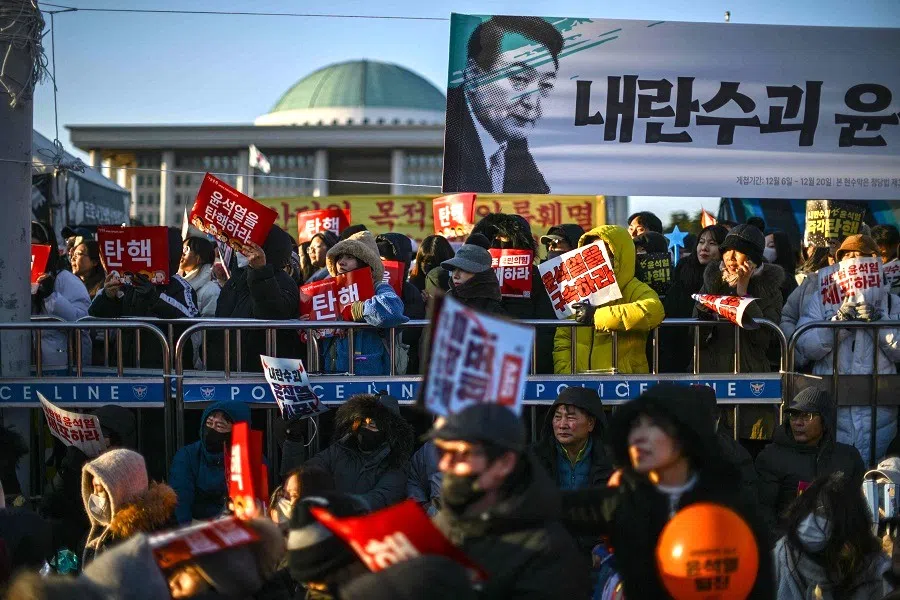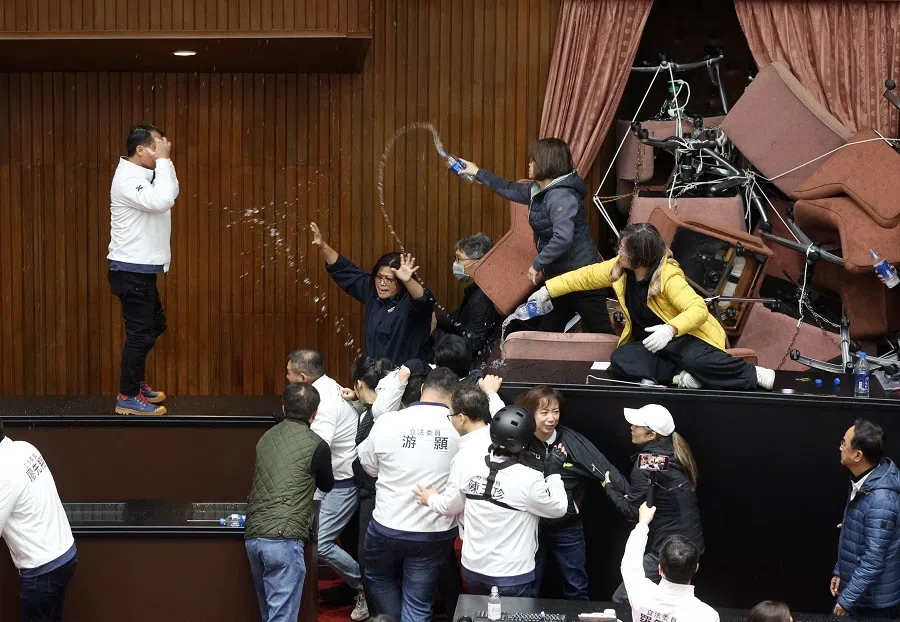Is Trump fuelling East Asia’s instability?
The impeachments and recall efforts in the Philippines, South Korea and Taiwan highlight a broader trend in East Asia: internal political struggles are increasingly shaped by external geopolitical pressures. Academic Hao Nan explains.

On 5 February, the Philippine House of Representatives voted overwhelmingly — 215 out of 306 members — to impeach Vice-President Sara Duterte, a move that has now been submitted to the Senate for a final verdict. The impeachment marks an unprecedented political battle between two of the country’s most powerful political dynasties: the pro-US, northern-based Marcos family and the pro-China, southern-based Duterte family. Although Marcos and Sara Duterte ran as allies in the 2022 election, their relationship quickly unravelled amid conflicts over government appointments, foreign policy and budget allocations.
The impeachment of Duterte is not an isolated incident. Instead, it is part of a broader wave of ouster attempts in East Asian democracies, including the impeachment of South Korean President Yoon Suk-yeol and the recall campaign against opposition legislators in Taiwan. More than just domestic political struggles, these events reflect the shifting geopolitical balance in the region as US foreign policy transitions from Biden’s multilateral approach to Trump’s signature transactional and “America First” stance.
The Marcos administration’s efforts to remove Duterte’s allies from key positions also meant a broader realignment that prioritised Washington’s interests under the Biden administration.
Deepening internal divisions in the Philippines
The Marcos-Duterte split is a symptom of the Philippines’ deepening internal political division, but it also underscores the country’s shifting foreign policy dynamics. Marcos since assuming the presidency, has leaned closer to the US, strengthening military ties and expanding base access to American troops. This stands in stark contrast to former President Rodrigo Duterte’s approach to partner with China for economic and infrastructure initiatives. The Marcos administration’s efforts to remove Duterte’s allies from key positions also meant a broader realignment that prioritised Washington’s interests under the Biden administration.

With the upcoming midterm elections in May — critical for the 2028 presidential race — and Marcos’s constitutional limitation of a single six-year presidential term, the impeachment of Sara Duterte is a power move that could neutralise a major challenger. However, this power play may also widen the divide within the country and push Duterte supporters toward anti-government mobilisation, as seen in the million-strong protests in Manila in January.
Uncertainties in South Korea’s future strategic alignment
The ongoing impeachment process of South Korean President Yoon Suk-yeol in December 2024, adds another layer to the regional political crisis. Yoon’s impeachment was triggered by his controversial declaration of emergency martial law, which was swiftly overturned by the National Assembly. The move led to mass protests and intensified political polarisation. While domestic factors, including corruption allegations and declining approval ratings, played a role, the deeper context of US-China rivalry cannot be ignored.
His impeachment, backed by opposition parties of a legislative majority with varied stances on foreign policy, signals uncertainty over South Korea’s future strategic alignment.
South Korea is a key US ally in the region, but Yoon’s policies — such as reinforcing military cooperation and strategic partnership with the US and Japan — have sparked concerns from China. His impeachment, backed by opposition parties of a legislative majority with varied stances on foreign policy, signals uncertainty over South Korea’s future strategic alignment. The episode highlights how domestic political struggles are increasingly intertwined with broader geopolitical competition.

In Taiwan, the ruling Democratic Progressive Party (DPP) has launched a large-scale recall campaign targeting opposition Kuomintang (KMT) legislators, aiming to shift the balance in the legislature. The DPP’s effort, framed as a necessary response to KMT-Taiwan People’s Party (TPP) coalition’s obstructionism, has deeper implications: it is an extension of Taiwan’s broader political struggle over cross-strait relations.
With the DPP President Lai Ching-te remaining confrontational in the cross-strait relations and Beijing intensifying its pressure on Taiwan, the DPP seeks to consolidate power and ensure that Taiwan remains aligned with US interests in exchange for the US security commitment. The recall campaign, while driven by internal legislative dynamics, also reflects Taiwan’s position as a frontline battleground in the US-China rivalry.
US allies and partners in Asia could face increased uncertainty, fuelling internal political instability as different factions align themselves with competing foreign policy visions.
The US factor
The wave of political ousters in East Asia coincides with a crucial shift in US foreign policy. Under President Biden, Washington pursued a minilateral strategy, working closely with allies and partners like the Philippines, South Korea, and Taiwan to contain China. This approach emphasised strengthening alliances and regional partnerships, leaving a complex US-centred web of small groupings with overlapping memberships and crossing agendas.
However, with the return of Donald Trump to the White House, US policy in Asia is on a path to be more transactional again, focusing on short-term American interests rather than long-term alliance commitments. Trump’s “America First” stance in his previous term created tensions with allies, as seen in his threats to withdraw US troops from South Korea and demand higher military contributions from partners. If Trump reverts to this approach with his foreign policy unfolding, US allies and partners in Asia could face increased uncertainty, fuelling internal political instability as different factions align themselves with competing foreign policy visions.
The impeachments and recall efforts in the Philippines, South Korea and Taiwan highlight a broader trend in East Asia: internal political struggles are increasingly shaped by external geopolitical pressures.
Concerns about political stability in the region
Governments and opposition forces alike are using impeachment and recall mechanisms not only to gain domestic political advantage but also to signal their stance in the evolving US-China rivalry. The Philippines’ Marcos-Duterte feud reflects Manila’s foreign policy pivot, Yoon’s impeachment signals uncertainty in South Korea’s strategic alignment, and Taiwan’s recall campaign is part of the island’s ongoing battle against mainland Chinese influence.

While impeachment and recall mechanisms are legitimate democratic tools, their frequent use in a short period raises concerns about political stability in the region. These processes can deepen divisions, weaken democratic institutions, and create uncertainty in governance. More critically, they may be exploited by foreign powers to sway domestic politics.
Above all, the rise of political ousters in East Asia is a double-edged sword. On one hand, it reflects the growing accountability of leaders and the increasing role of democratic institutions. On the other, it exposes the region to heightened instability, making it more susceptible to external manipulation.
As the US transitions from Biden’s multilateralism to Trump’s transactional diplomacy, the region’s political landscape will likely remain volatile. For East Asia, the challenge is not only to manage internal divisions but also to navigate the shifting currents of global power politics. The coming months will be crucial in determining whether these impeachments and recalls serve to strengthen democracy or merely become instruments of geopolitical manoeuvring.



![[Big read] When the Arctic opens, what happens to Singapore?](https://cassette.sphdigital.com.sg/image/thinkchina/da65edebca34645c711c55e83e9877109b3c53847ebb1305573974651df1d13a)
![[Video] George Yeo: America’s deep pain — and why China won’t colonise](https://cassette.sphdigital.com.sg/image/thinkchina/15083e45d96c12390bdea6af2daf19fd9fcd875aa44a0f92796f34e3dad561cc)
